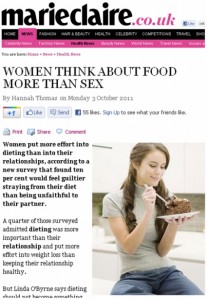Want to be heard? Speak up!
 Do women have an equal voice in groups?
Do women have an equal voice in groups?
Apparently the answer is no, especially when men comprise the majority at the table. And while this may appear to be trivial, it speaks volumes about what happens when men and women are part of important deliberating bodies, such as Advisory Boards or even political bodies. Who’s influencing whom, for example? Moreover, what can be done about?
Writing in the American Political Science Review, Assistant Professor of Political Science (Brigham Young) Christopher Karpowitz suggests that while more than 100 countries have mandated a 30% minimum quota for women on governing or political bodies, their voices are still not being heard and gender inequality is the rule, not the exception. Yet, the reason for this may be more complicated than at first glance; it seems that women don’t always speak up when given the opportunity. Toward that end, Karpowitz adds that “girls and boys are socialized to different gendered cultures of interaction and they carry these implicit scripts of behavior with them into adulthood.” Consequently, in a meeting where men dominate in number, they may also dominate in voice as the dynamic in the room shifts towards assertion, competition and dominance versus a spirit that is often considered feminine, i.e. cooperation, intimacy and inclusion.
Karpowitz and his colleagues point out that this paradigm of exclusion actually shifts when groups must come up with an unanimous decision. In fact, when the researchers challenged 94 groups of men and women to discuss the best way to distribute money that they theoretically earned together, they found that In the majority of cases and regardless of how proportioned the gender make up was, women spoke less than 75% of the time that their male peers spoke. When they were the minority, women consistently spoke less and were perceived as less influential by the group. However a shift took place when the majority rule was thrown out the window.
There’s an old say that ‘time is money.’ In the case of decision making, it appears that how much time one voices one opinion is more important than how many opportunities one is provided with to do so. The underlying rule of thumb is that the rules are more stringent and the outcomes have a greater stake. If you wish to play a role, speak up. It’s essential, not only for equality but also, because women bring “unique and helpful perspectives to [issues] under discussion.” Karpowitz points out what many of us intuitively know: “We’re not just losing the voice of someone who would say the same things as everybody else in the conversation.”
Read More
Wednesday Bubble: Should Fatties Get a Room…and Other ‘Fine’ Assaults on Women… Guest Post by Dr. Brian Hughes
My friend Dr. Brian Hughes is at it again. “At what,” you ask? At identifying media assaults on women, on aging and on identities. You may recall that I ran Brian’s piece on ageism back in July of this year. And I am honored to run another post. Once again, I hope that you’ll show Brian some love and spread the word, not only about the post but also his work on The Science Bit Blog. Many thanks Brian!
I don’t know much about Marie Claire, but it appears to be some sort of magazine/website for people who hate women. At least, that’s the conclusion I drew from reading this story in their UK edition’s Health News section: “Women Think About Food More Than Sex“. In genre terms, this is something of a high concept piece, one of those articles that sums up everything it has to offer within the phrasing of its title alone (a bit like “Snakes on a Plane“).
So what did they find? Firstly, a full 25% of women ”admitted” that dieting was more important to them than their intimate relationships. In fact, get this:
…ten per cent would feel guiltier straying from their diet than being unfaithful to their partner.
That’s right. Marital (or relationship) infidelity — the stuff of epic romantic drama at least since the mythology of the ancient Greeks — is actually not that significant after all. What matters more is diet adherence. So, while Hester Prynne appeared somewhat perturbed throughout The Scarlet Letter, at least all she had to deal with was the stigma of her sexual indiscretion. Imagine if the townsfolk found out about that extra chocolate biscuit she used to scoff during coffee breaks…
Here are some more findings:
The most common reason for women in the UK to start a diet is to get the perfect beach body–while one in seven say cruel taunts are the reason they reign [sic] in their eating.
So women become self-conscious about their bodies due to beach paranoia andtaunting, eh? Well I guess that has nothing at all to do with articles appearing in magazines. Magazines like Marie Claire, for example…
How about these delightful pieces: “Are Leggings Making You Fat?“; “Could Your Fridge Be Making You Fat?“; “Curvy Models ‘Make Women Fat’“; “Diets That Make You Fat“; “Healthy Foods That Make You Fat“; “Is Your Air Conditioner Making You Fat?“; “Can A Common Virus Really Make You Fat?“; “3 Surprising Things That Make You Fat” (stilettos, your partner’s education, and boredom, apparently); “3 Fats That Make You Skinny” (ooh-er, now I’m confused); “10 Best Celebrity Beach Bodies“; ”From Flab To Fab: Your Holiday Survival Guide“; and “Get A Beach Body Fast“.
Uh huh. No grounds for paranoia or for beach-body neurosis there at all.
And as for cruel taunts, how about this memorable Marie Claire column called ”Should ‘Fatties’ Get A Room?“ Here’s an excerpt:
So anyway yes, I think I’d be grossed out if I had to watch two characters with rolls and rolls of fat kissing each other…because I’d be grossed out if I had to watch them doing anything. To be brutally honest, even in real life, I find it aesthetically displeasing to watch a very, very fat person simply walk across a room…
I think I understand why “one in seven (UK) women” modify their eating due to “cruel taunts“. They are obviously Marie Claire readers.
Still, while all that looks pretty terrible and offensive, at least Marie Claire quote a nutritionist to advise readers that “Dieting should never become an obsession“. So that’s alright then. Hands washed.
As it happens, “women think about food more than sex” is a well phrased, nicely falsifiable hypothesis. Either it is true or it is not. All that we need is data from a sample of women that is both large and statistically representative of the general population, regarding (a) the extent to which they think about food and (b) the extent to which they think about sex. Then we can do a simple statistical test tocompare these two values in order to determine which subject, on average, is thought about the most.
But of course, that’s not what we get here. Instead we have a pretty standard population-based survey study, with minimalist description of methodological details. Marie Claire report the findings as “Health News“, presenting statistical factoids that imply a basis in a comprehensive dataset but avoiding anything as troublesome as even a sample size.
In fact, according to the UK Press Association, the study examined responses from over 1,200 women, which sounds comprehensive enough. However, we are not told what questions were asked or what other findings the researchers discovered. This is because the study is not actually a piece of formal science. Rather, it’s a bog standard market research survey conducted by a private company who have a commercially vested interest in reporting particular results.
The survey is brought to us by Atkins, the people who make a profit every time a woman buys one of their dieting products. They seem to churn out lots of this type of research (see here, here, and here), all of which goes directly to newswires and yields findings that encourage women to turn dieting into an obsession. And thatnutritionist that Marie Claire get to warn women not to turn dieting into an obsession? Yeah, well she works for Atkins. In fact, she’s their “Chief Nutritionist“.
 Guess which one of these corporate value statements is my favourite
Guess which one of these corporate value statements is my favouriteWe’ve been here before. Pseudoscience in the service of corporate greed is depressing enough on its own. But it is truly amazing how women’s magazines and media outlets become complicit in this baloney. Instead of providing a service that is of actual benefit to women, these magazines end up assisting a corporate marketing strategy designed to maximize profits by generating and exploiting reader confusion.
Hey, for all I know (and I don’t), women might well think more about food than about sex. But let’s just remember this. Women’s magazines think more about their profitable relationships with corporate advertisers than about the edification — or mental health — of their readers.
Yeah! Go women!
About the author…
Dr Brian Hughes is a lecturer in Psychology at the National University of Ireland, Galway and author of Conceptual and Historical Issues in Psychology (Prentice Hall, 2011). When he is not writing or lecturing, you can find him lending his views on Twitter.
Read MoreShe works harder for the money
Awhile back, I wrote a post about how menopause impacts our occupational health and the need for greater awareness among managers of the types of health challenges that their middle aged female employees might be going through. This issue is evidently an ongoing hot button, as it has popped up again in a study that is current online at the Menopause journal site.
There are several conditions that affect work participation and demands, including menopause. And although there is some indication that abseenteeism is highest among women 45 years and older compared to their male contemporaries, the reasons have not been entirely elucidated. By gaining a better understanding of the factors that influence the balance between resources and work demands, there may be a greater openness to understanding and managing expectations by both the employee and the employer.
To explore this further, and using two scientific scales as a foundation, researchers looked into the severity and frequency of psychological, somatic, vasomotor and sexual symptoms and their potential impact on physical and mental work demands, health status and resources in208 women between the ages of 44 and 6o Additionally, they evaluated individual and lifestyle factors that might skew results, as it has been shown previously that among both men and women, lower education, older age, overweight, smoking and lack of exercise all negatively affected work ability.
The result? there was a negative and significant association between menopausal symptoms and work ability. Moreover, even after theyadjusted for some of the factors mentioned above, they found total work ability scores declined by almost a half a point for every one point on the total symptoms scale score. Mental health played a huge role as did somatic symptoms such as sleep disturbances, insomnia, joint pain or mood swings.
If these findings are extrapolated to real world situations, workplace interventions such as yoga breaks, exercise and stress reduction strategies, coupled with a self awareness of overall health and how symptoms detract from that (or not) are simple first steps towards finding a solution and improving work ability. The other piece of this, however, i.e. to openly communicate to our work colleagues, our managers, our partners and our friends how productivity and our relationships may be suffering and actively involve them in finding solutions, might not be so simple.
Often, one of first thing that’s pulled out of the aging hat is the fear that an employee is easily replaced. This has never been truer than in today’s economic environment where the numbers of willing and able workers are stacked against those who are holding onto their jobs by a string and a prayer. As a menopausal woman, do you really want to hand your employer a reason to replace you? I’m betting that the answer is no. Consequently, I am unclear about the best strategy for finding the elusive balance between work ability, resources and symptoms.
Any thoughts or ideas? I’d love to hear them. Let’s get a dialogue going, particularly if you are working harder for the money because of symptoms.
Read MoreBe still my beating heart?
Menopause causes a woman’s risk for dying from heart to disease to spike, correct? If you take a look at the studies I’ve been writing about since starting this blog, the answer would be an unequivocal “yes.”
What we do know to be true is that risk for heart disease increases with age and that heart disease is a leading cause of death among women. Yet, symptoms can be different in women and may even show up at a later age compared to men. Still, the long-held theory that menopause acts as an accelerator and an equalizer has just been turned on it’s toes by a newly published study in the British Medical Journal.
The study authors say that clinical and epidemiological data that demonstrate that menopause is key culprit are simply not there. Rather, they believe that women’s increase in deaths from heart disease can be attributed to a gradual decline of cells that act to repair and replenish our circulation. To prove their point, they reviewed death from heart disease over time in three different cohorts based on the time period when they were born (i.e. 1916-1925, 1926-1935 and 1936-1945).
Indeed, what they found was that none of the groups of women had any sort of significant upswing in heart disease deaths around the time of menopause. Instead, deaths from heart disease increased exponentially over time — by 7.9% per age year. In contrast, death from heart disease in men increased by about 30% per year up to age 45 and then slowed to about 5.2% per year thereafter.
When it comes to heart disease, the great equalizer between women and men appears to be age and not hormones. Even then, more men can be expected to die from heart disease than women, at least until an advanced age.
The reason this is so important is that the focus in women has long been on menopause and efforts to improve heart health based on that time period. The findings imply that we need a wake up call and that efforts to improve our hearts should be based on lifetime risk rather than the time from menopause and beyond.
The time is now ladies. Be kind to your heart; focus on diet, exercise and weight. And truly, still the risk for heart disease before it stills your beating heart for good.
Read More
Women’s health: “it’s a spiral, not a bulls-eye.”
“A spiral is the path; it is the journey. I walk it with you, and do not do it to you. It represents life. It represents women…”
My friend and colleague Regina Holliday wrote these words about a jacket that she has painted on my behalf, a jacket that represents women’s struggles to overcome the restrictions that challenge their right to adequate healthcare and a jacket that I will be honoured and privileged to wear this coming Tuesday during The Walking Gallery. She has depicted this struggle within the framework of a triskelion symbol, three interlocked spirals that is used to depict three reproductive cycles in a woman’s life (maiden, mother, crone). In the Celtic belief system, the three-legged triskelion represents:
- personal growth
- human development
- spiritual expansion
as well as the phases of the moon, i.e. waxing, waning and full. I relate to this concept mostly because of its fluidity and the creative way in which Regina has characterized a woman’s struggle throughout her lifetime.
The jacket that I will wear is dedicated to all of my readers and to women everywhere who are under attack strictly because of their gender and their ability to reproduce. It seems sort of ridiculous doesn’t it? And yet, as I wrote last year in Disruptive Women in Healthcare, the other side of the aisle is not a political party but rather, women, gender bias and reproductive rights biases.
If you are local, I hope that you will come out and support the event (there are free tickets available), a wake up call that the patient struggle is very real and affects all of us. Regina describes this as follows:
If you can’t make it, I do hope that you’ll start paying attention to Regina because she is a patient advocate of the first degree and her generosity of spirit and pureness of heart is virtually unsurpassed. Trust me; she is someone you want fighting for you when the healthcare chips are down.
Thank you Regina…from my heart. I can’t wait to represent!
Read More








